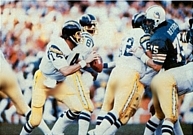| 1981 San Diego Chargers season | |
|---|---|
| Owner | Gene Klein |
| General manager | Johnny Sanders |
| Head coach | Don Coryell |
| Home field | Jack Murphy Stadium |
| Results | |
| Record | 10–6 |
| Division place | 1st AFC West |
| Playoff finish | Won Divisional Playoffs (at Dolphins) 41–38 (OT) Lost AFC Championship (at Bengals) 7–27 |
| Pro Bowlers | 5[1] |
| AP All-Pros | 3[2]
|

The 1981 San Diego Chargers season was the franchise's 12th season in the National Football League (NFL) and its 22nd overall. The team failed to improve on their 11–5 record from 1980 but they did retain the AFC West Division title for the third consecutive year, finishing 10–6. In the playoffs, they beat the Dolphins in a classic game known as the Epic in Miami then lost to the Bengals in a frigid game known as the Freezer Bowl.
1981 was the second straight season in which the Chargers reached the AFC Championship Game,[note 1] as well as their second consecutive loss.
During this season, the Chargers lost two key players by way of trade. Before Week 3, wide receiver John Jefferson was dealt to the Green Bay Packers while defensive end Fred Dean would be dealt to the eventual Super Bowl champion San Francisco 49ers by Week 5. The Chargers brought in Wes Chandler from New Orleans to replace Jefferson. After a slow start, he finished with 857 yards from 12 games (he had 1,142 yards on the season, counting his four games with the Saints). The other starting wideout was Charlie Joiner who had one of his best seasons at age 34, gaining a career-high 1,188 yards and matching his career-best with 7 touchdowns. Rounding out the trio of receiving stars, tight end Kellen Winslow led the league in receptions for the second consecutive year, finishing with 88 catches for 1,075 yards and 10 touchdowns.
Quarterback Dan Fouts broke the NFL record for passing yardage for the third consecutive season, averaging 300 yards per game for the first time as he totaled 4,802. His touchdown-to-interception ratio was the best of his career at 33 to 17. He was helped in this by a strong offensive line, anchored by veterans Russ Washington and Doug Wilkerson who conceded only 19 sacks from 16 games, their best performance through Fouts' 15 years with the club. Running back Chuck Muncie enjoyed his best season, running for 1,144 yards and 19 touchdowns, tying the then-NFL season record for rushing touchdowns.[3][4] With rookie James Brooks and John Cappelletti also contributing, San Diego rushed for over 2,000 yards for the only time during the pass-focussed Don Coryell's tenure.
While the offense was soaring to new heights, the defense collapsed in Dean's absence, becoming among the league's worst. They continued to be tough against the run but with veteran safety Glen Edwards absent with injury through the first half of the season, they dropped to dead last against the pass: the 4,311 yards they conceded were a new NFL record. On the plus side, they did manage an above-average 23 interceptions with Willie Buchanon snagging a team-leading five. San Diego's sack count declined somewhat from 60 to 47, tied for third-best in the NFL. New starter John Woodcock tied with Gary Johnson as team-leaders, each managing 9.5 sacks.
On special teams, James Brooks put in a strong performance: his 13.2 yards per punt return was second best in the league with 23.7 yards per kickoff return, he ranked seventh.[5] Rolf Benirschke made 19 of 26 field goals, including two late game-winners.
The season was chronicled on September 18, 2008 for America's Game: The Missing Rings as the greatest NFL team to never win the Super Bowl.
- ^ "1981 NFL Pro Bowlers". Pro-Football-Reference.com.
- ^ "1981 NFL All-Pros". Pro-Football-Reference.com.
- ^ "Chuck Muncie dies at age 60". ESPN.com. May 14, 2013. Archived from the original on June 8, 2013.
- ^ "AFC West". Sports Illustrated. September 1, 1982. Archived from the original on July 9, 2019. Retrieved May 18, 2013.
- ^ "1981 NFL Kick & Punt Returns". Pro-Football-Reference.com.
Cite error: There are <ref group=note> tags on this page, but the references will not show without a {{reflist|group=note}} template (see the help page).